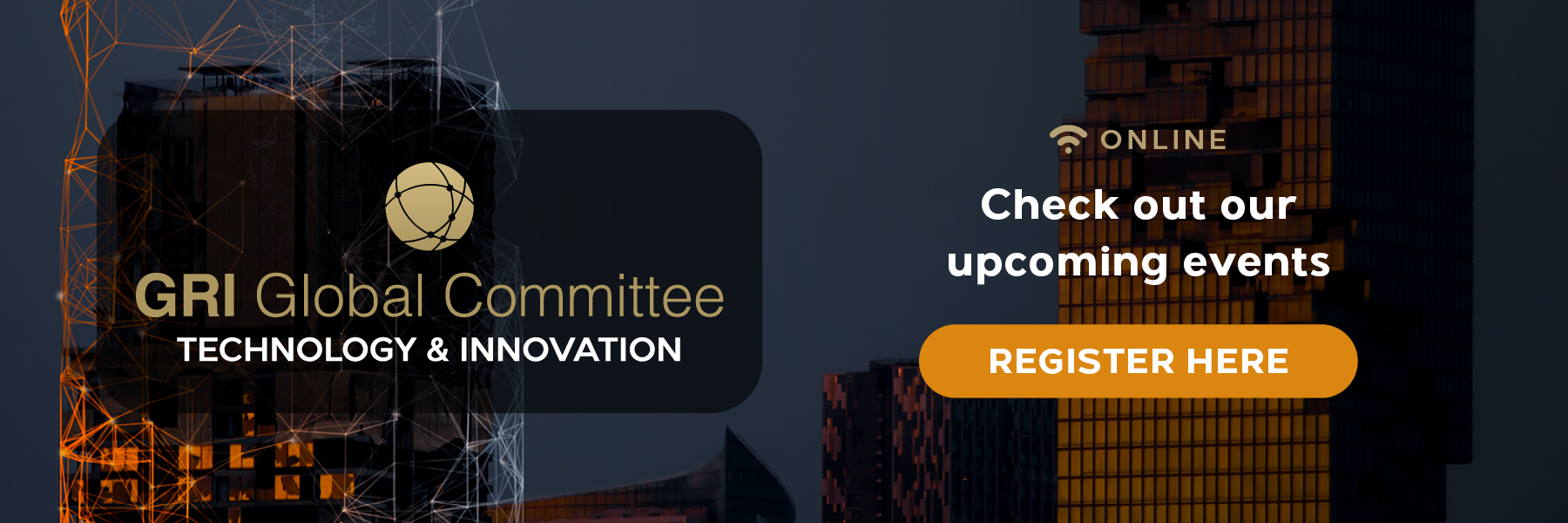 Joshua Sortino
Joshua SortinoCloud Portfolio Management in a Real Estate Portfolio
Are we in a period of embracing more technology & innovation?
June 2, 2022PropTech
The GRI Global Committee gathered investors, developers, and special guests with technological expertise. They explored what’s next for unlocking the full potential to achieve a green and scalable portfolio
The virtual session happened on May 25th, 2022.
Important Takeaways:
*Disclaimer: While this review highlights the most relevant topics under discussion, it does not contemplate the full discussion between the Board and all Members. In addition, committee sessions also dedicate time for networking.

According to research carried out by advisory Intelligent Buildings in partnership with Ivanhoé Cambridge, companies are under greater pressure to ramp up tech innovation and ESG solutions for buildings, especially in the post-pandemic scenario.
However, with such demands, owners and developers are increasingly adopting technology to create differentiation in their offerings, and assets might get even more fragmented down at the building level.

In sharing a case study, findings from Intelligent Buildings/Ivanhoe show that one of the biggest challenges portfolio owners and developers face right now is how to meet market pressures without chasing every technology released in the market.
When it comes to a regionally diverse portfolio, securely connecting building technology to a cloud portfolio might be a turning point.
Another related hurdle concerns data privacy issues. From one side, tenants want more control in using technology as an enabler in their processes. However, committee members pointed out that getting data, even from electrical usage, can be a headache. Not due to lack of technology, but because of data protection regulations.
Big data technology is interwoven with several other market pressures, particularly with ESG commitments.
For some senior leaders, a technological approach that departs from solving environmental bottlenecks should be of much greater interest to both tenants and investors.
Driving carbon reporting metrics across a complex portfolio is one main challenge for innovation. A consistent approach with a uniform system may result in increased transparency across a portfolio.
According to Intelligent Buildings/Ivanhoé Cambridge research, connecting building systems into a cloud portfolio is also crucial to ESG goals. It can provide wider access to data that reports to a net-zero program.
Middle East investors highlighted the fact that ventures are mainly driven by inputs such as ROI and total revenue, and rarely focus on the softer factors or variables that come out of buildings.
Private equity investors, for example, might expect a three-year payback from a building project. The implementation of ESG technologies and systems in new developments becomes problematic as high returns on the short-term ROIs will be affected.
All participants in this committee session agreed that when it comes to implementing innovative technology and ESG reporting, a cultural shift in terms of investment is needed. Getting people to change their mindsets will be key to a long-term vision and collaboration among all stakeholders.
Members from the sessions suggested that underlining the tech & ESG advantages from a practical standpoint is the first step. Data is more than ever of extreme relevance and will be more and more decisive for ESG goals, privacy protection, and cyber security.
Another concern raised by asset managers is linked to the risk of installing new systems.
Before connecting all buildings in a portfolio, members argued that organizations should really understand what they want to achieve in the first place. It means starting with the value chain, having a proof of concept, and scaling up from there.

The overall approach to impact investing and innovative solutions on portfolios is still a head-scratcher for most leaders. However, what members were in agreement with was that a shift from the cultural side is crucial.
In order to unlock the full potential to achieve a green and scalable portfolio, we might start by understanding the organizational goals. Connecting buildings into one cloud portfolio should be the next move.
About the GRI Global Committee
GRI Global Committees set the professional standard for peer-to-peer knowledge sharing. They function as think tanks that bring impactful, online, international conversations, and top-notch content to our members. Get sparks of inspiration with the world’s foremost real estate investment decision-makers.
– Lucas Brancucci | GRI Global Committee Production Team.
The virtual session happened on May 25th, 2022.
Important Takeaways:
- Technology & ESG in real estate emerged as a key theme during 2020-21, and now is a priority for global investors;
- While operators are increasingly adopting technology in their offerings, assets get more fragmented. Connecting them into a cloud portfolio is key;
- Driving carbon reporting metrics across a complex portfolio is one main challenge for innovation;
- Before applying new systems to a portfolio, organizations should first understand what they want to achieve, starting with the value chain.
*Disclaimer: While this review highlights the most relevant topics under discussion, it does not contemplate the full discussion between the Board and all Members. In addition, committee sessions also dedicate time for networking.

More technology means more fragmentation in portfolios
According to research carried out by advisory Intelligent Buildings in partnership with Ivanhoé Cambridge, companies are under greater pressure to ramp up tech innovation and ESG solutions for buildings, especially in the post-pandemic scenario. However, with such demands, owners and developers are increasingly adopting technology to create differentiation in their offerings, and assets might get even more fragmented down at the building level.
In sharing a case study, findings from Intelligent Buildings/Ivanhoe show that one of the biggest challenges portfolio owners and developers face right now is how to meet market pressures without chasing every technology released in the market.
Privacy and cyber security
Andy Schonberger, VP at Intelligent Buildings, explained that cyber-related security breach is getting more challenging due to the increasing number of documented intrusions and the availability of low or no-cost hacking tools.When it comes to a regionally diverse portfolio, securely connecting building technology to a cloud portfolio might be a turning point.
Another related hurdle concerns data privacy issues. From one side, tenants want more control in using technology as an enabler in their processes. However, committee members pointed out that getting data, even from electrical usage, can be a headache. Not due to lack of technology, but because of data protection regulations.
ESG reporting
Big data technology is interwoven with several other market pressures, particularly with ESG commitments. For some senior leaders, a technological approach that departs from solving environmental bottlenecks should be of much greater interest to both tenants and investors.
Driving carbon reporting metrics across a complex portfolio is one main challenge for innovation. A consistent approach with a uniform system may result in increased transparency across a portfolio.
According to Intelligent Buildings/Ivanhoé Cambridge research, connecting building systems into a cloud portfolio is also crucial to ESG goals. It can provide wider access to data that reports to a net-zero program.
Technical hurdles or cultural mindsets?
Although there is pressure for green innovation, impact investments are causing leaders to worry about returns.Middle East investors highlighted the fact that ventures are mainly driven by inputs such as ROI and total revenue, and rarely focus on the softer factors or variables that come out of buildings.
Private equity investors, for example, might expect a three-year payback from a building project. The implementation of ESG technologies and systems in new developments becomes problematic as high returns on the short-term ROIs will be affected.
All participants in this committee session agreed that when it comes to implementing innovative technology and ESG reporting, a cultural shift in terms of investment is needed. Getting people to change their mindsets will be key to a long-term vision and collaboration among all stakeholders.
Members from the sessions suggested that underlining the tech & ESG advantages from a practical standpoint is the first step. Data is more than ever of extreme relevance and will be more and more decisive for ESG goals, privacy protection, and cyber security.
Scaling with technology does not start with technology
“How do you know if you have the right technology? How do you know if it will actually make the portfolio scalable?”Another concern raised by asset managers is linked to the risk of installing new systems.
Before connecting all buildings in a portfolio, members argued that organizations should really understand what they want to achieve in the first place. It means starting with the value chain, having a proof of concept, and scaling up from there.
The overall approach to impact investing and innovative solutions on portfolios is still a head-scratcher for most leaders. However, what members were in agreement with was that a shift from the cultural side is crucial.
In order to unlock the full potential to achieve a green and scalable portfolio, we might start by understanding the organizational goals. Connecting buildings into one cloud portfolio should be the next move.
Session Highlights:
About the GRI Global Committee
GRI Global Committees set the professional standard for peer-to-peer knowledge sharing. They function as think tanks that bring impactful, online, international conversations, and top-notch content to our members. Get sparks of inspiration with the world’s foremost real estate investment decision-makers.
– Lucas Brancucci | GRI Global Committee Production Team.